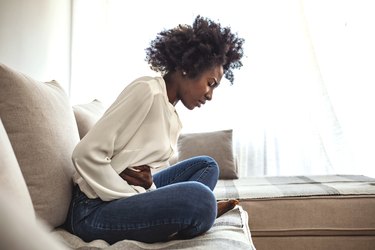
If you have a stomach ulcer — also known as a peptic ulcer — you probably know that eating can make your ulcer pain worse. But did you know that pain is caused by acid produced in your stomach, not by the type of food you eat? Chocolate, sugar or fruits are all the same to an ulcer.
"The type of food you eat has no effect on a stomach ulcer. There is no evidence that sweets or any other food causes an ulcer or makes an ulcer worse," says Brooks Cash, MD, division director, Gastroenterology, Hepatology, and Nutrition at the University of Texas Health Science Center at Houston.
Video of the Day
Video of the Day
Read more: What Can I Eat and Drink with a Peptic Ulcer?
What Causes Peptic Ulcer Pain?
An ulcer in your stomach is a gastric ulcer and an ulcer in your small intestine is a duodenal ulcer, according to the American College of Gastroenterology. The two most common causes of peptic ulcers are a bacterial infection called H. pylori and medications like Advil or Motrin, known as NSAIDs.
"NSAIDs and H. pylori both cause the protective mucous layer in your stomach or upper intestine to deplete, and that allows acid produced in your stomach to create an ulceration," Dr. Cash says.
According to the National Institute of Diabetes and Digestive and Kidney Diseases (NIDDK), peptic ulcer pain is dull or burning pain between your belly button and your breastbone. Ulcer pain may be worse when your stomach is empty. It may get worse after you eat or it may get better after you eat.
"Peptic ulcer pain depends on the type of ulcer you have. If you have a gastric ulcer, any food you eat may stimulate acid production in your stomach and make your pain worse. If you have a duodenal ulcer, food you eat may trigger your pancreas to secrete bicarbonate into your upper intestine. Bicarbonate is natural antacid, so eating may make your pain better," Dr. Cash says.
What Is the Best Ulcer Diet?
NIDDK says that diet and nutrition do not play a role in ulcer disease. In the past, people drank milk to sooth ulcer pain, but today we know that milk or any other food does not cure an ulcer or reduce ulcer pain. Three things that you should avoid are NSAIDs, smoking and drinking alcohol.
Even though sweets do not affect ulcers, everyone should limit adding sugar to their diet, according to the Centers for Disease Control and Prevention (CDC). Too much sugar will not cause ulcers but it can lead to obesity, type 2 diabetes and heart disease. You should check labels on all your foods and beverages for calories from sugar and avoid adding sugar to your food. For an average American adult, the limit for sugar is about 200 calories per day.
Manage Your Ulcer Disease
The Cleveland Clinic says lifestyle changes and medications are the best way to manage peptic ulcer disease. You should stop smoking and avoid alcohol. You should also avoid NSAID medications. NSAIDs include over-the-counter pain and fever medications like aspirin, ibuprofen and naproxen. Acetaminophen (Tylenol) is not an NSAID and is a better option.
The Cleveland Clinic says that two medications are most important for managing peptic ulcer disease. Proton pump inhibitors (PPIs) reduce stomach acid enough to let an ulcer heal. Antibiotics prescribed by your doctor may be needed if you test positive for the bacteria H. pylori.
If you have peptic ulcer disease, let your doctor know if you have ulcer pain. Other symptoms may include nausea, vomiting or feeling bloated.
The most important symptom to watch out for is bleeding. Bleeding from an ulcer can be dangerous. Always let your doctor know if you vomit blood or have dark, tarry stools. Bleeding can also be slow and unnoticed, so let your doctor know if you have symptoms of anemia caused by slow bleeding such as tiredness, pale skin or shortness of breath, says the American College of Gastroenterology.
- American College of Gastroenterology: "Peptic Ulcer Disease"
- Brooks D. Cash, MD, division director, Hepatology, and Nutrition, University of Texas Health Science Center at Houston
- National Institute of Diabetes and Digestive and Kidney Diseases: "Peptic Ulcers (Stomach Ulcers)"
- Centers for Disease Control and Prevention: "Know Your Limit for Added Sugars"
- Cleveland Clinic: "Peptic Ulcer Disease: Management and Treatment"
Is this an emergency? If you are experiencing serious medical symptoms, please see the National Library of Medicine’s list of signs you need emergency medical attention or call 911.